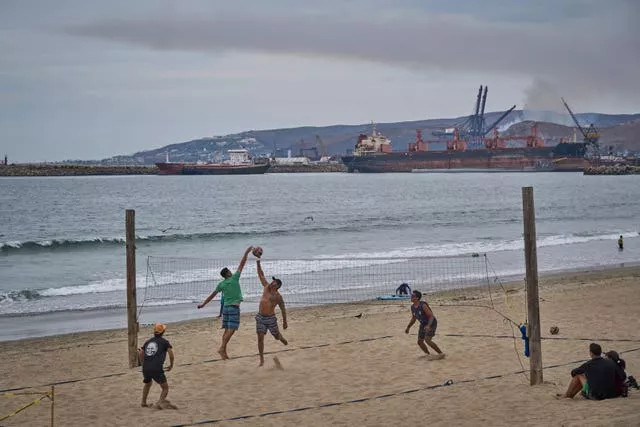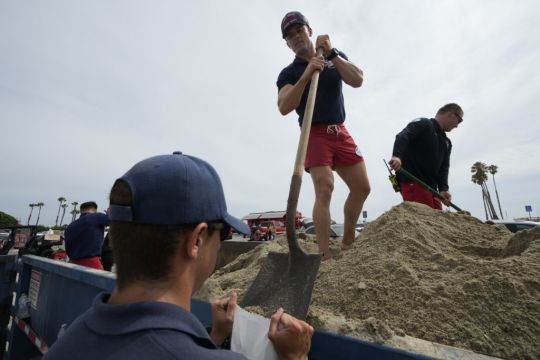Hurricane Hilary neared landfall on Mexico’s Baja California peninsula as a still-dangerous Category 1 hurricane carrying so much rain that forecasters said “catastrophic and life-threatening” flooding is likely across a broad region of the southwestern US.
The National Weather Centre in Miami said that as of 5am the storm was “very near” the Baja coast south of Ensenada, and 285 miles from San Diego, California.
The maximum sustained wind speed dropped to 80mph while spreading “heavy rains” northward over the peninsula.
Meteorologists warned that despite weakening, the storm remained treacherous.
One person drowned on Saturday in Mexico’s town of Santa Rosalia, along the peninsula’s eastern coast, when their vehicle was swept away in an overflowing stream.
Rescue workers managed to rescue four other people, according to Edith Aguilar Villavicencio, the mayor of Mulege township.

While it was not immediately clear whether officials consider the fatality to be related to the hurricane, footage posted by local officials showed torrents of water coursing through the town’s streets.
Forecasters said the storm is still expected to enter the history books as the first tropical storm to hit Southern California in 84 years, and bring along flash floods, mudslides, isolated tornadoes, high winds and widespread power outages.
California Governor Gavin Newsom proclaimed a state of emergency on Saturday, and officials urged people to finish their preparations by sundown. By Sunday, one expert said, it would be too late.
The hurricane is the latest major climate disaster to wreak havoc across the US, Canada and Mexico.
Hawaii’s island of Maui is still reeling from last week’s blaze that killed over 100 people and scorched the historic town of Lahaina, making it the deadliest US wildfire in more than a century.
In Canada, firefighters on Saturday continued to battle blazes during the nation’s worst fire season on record.
Meanwhile, Hilary brought heavy rainfall and flooding to Mexico and the southwestern US on Saturday, ahead of the storm’s expected Sunday border crossing.
It is expected to dump up to 10 inches (25 centimetres) — a year’s worth of rain for some areas — in southern California and southern Nevada.

Meteorologists also expect the storm to churn up “life-threatening” surf conditions and rip currents — including towering waves up to 40 feet (12 metres) high — along Mexico’s Pacific coast.
Dozens sought refuge at storm shelters in the twin resorts of Los Cabos, at the southern tip of the Baja peninsula, and firefighters used an inflatable boat to rescue a family in San Jose del Cabo after the resort was hit by driving rain and wind.
Mexico’s Navy evacuated 850 people from islands off the Baja coast, and deployed almost 3,000 troops for emergency operations.
In La Paz, the picturesque capital of Baja California Sur state on the Sea of Cortez, police patrolled closed beaches to keep swimmers out of the whipped-up surf.
The US hurricane centre posted tropical storm and potential flood warnings for Southern California from the Pacific coast to interior mountains and deserts as far north as eastern Oregon and Idaho.
The San Bernardino County sheriff on Saturday issued evacuation warnings for several mountain and foothill communities ahead of the storm.
And an evacuation advisory for the tourist destination of Santa Catalina Island, 23 miles (37 kilometres) off the Southern California coast, urged residents and beachgoers to leave, while authorities in Los Angeles scrambled to get the homeless off the streets and into shelters.
Across the region, municipalities ran out of free sandbags and grocery shelves emptied out as residents stockpiled supplies.
The US National Park Service closed California’s Joshua Tree National Park and Mojave National Preserve to keep visitors from becoming stranded amid flooding.







